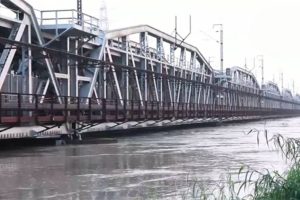Green warriors in Agra on Sunday demanded urgent measures to save the dying Yamuna river, the lifeline of the Sri Krishna land (Braj Bhoomi), from pollution and restricted flow of fresh water from upstream barrages.
At a people’s conference held at the Etmauddaula View Point, the activists expressed concern and disgust at the continued neglect of the Yamuna river in Agra, the city of the Taj Mahal and other glorious Mughal monuments that attracted millions of tourists round the year.
“More than three decades after the SC intervention in the MC Mehta case, to control environmental pollution in the eco-sensitive Taj Trapezium Zone, conditions in respect of air and water pollution remain almost the same, though over a thousand crores of rupees have been spent on nonspecific schemes,” environmentalist Devashish Bhattacharya said.
The members of the River Connect Campaign demanded a White Paper detailing all the money, and grants, sanctioned under various projects for river cleanup, the various Action Plans, the actual work done, and the results thereof.
“For want of accountability and lack of transparency no one knows what work has been done and what milestones had been covered,” the activists said.
Neither the drains and open nalas have been tapped or diverted, nor has the continuous discharge of industrial effluents stopped in the industrial clusters of Haryana and Delhi, said Deepak Rajput.
For many years, the NGT has been persuading the district authorities in Mathura, Vrindavan, and Agra to demarcate the flood plains, and all encroachments but there has been no action. Political will is lacking and the corrupt bureaucracy scuttles all initiatives in this direction, said Pandit Jugal Kishor.
Two decades ago, the Agra police had formed river police squads, but now there is no trace of this body set up to control pollution in the river, Jugal Kishor added.
The district authorities in Agra have shown no interest in shifting the transport companies from the Yamuna Kinara road, shifting cattle sheds from the congested city areas, shifting dhobi ghats, and cremation grounds, and clearing the encroachments along the river banks, pointed out Raj Kumar Maheshwari.
Activist Nidhi Pathak said despite repeated demands over the years, the government bodies had not initiated any plan for regular dredging of scum and desilting of the river bed to increase the holding capacity during the monsoon months.
In a resolution, the conference members said air pollution in Agra and the drying up of the river Yamuna were critical issues that called for drastic action by the state government.
Yamuna and its basin rivers have a crucial ecological importance. Their degradation negatively affects the ecosystem of the fragile Taj Trapezium Zone, spread over 10,400 sq km.
Air pollution caused by the dry river Yamuna and its tributaries has begun impacting the health of the citizens, as well as of the local flora and fauna.
The Yogi government has ignored the historical, religious, and cultural significance of the river Yamuna, which was integral to the Sri Krishna Radha lore of the Braj Mandal.
Yamuna was worshipped by millions of Sri Krishna devotees but when they come to its banks, they are disgusted and angry.
“Why the governments at the centre and the state have failed to remedy the situation,” they ask angrily.
The Yamuna barrage project hangs fire with no hope of an early start of work on this crucial project that could save the Taj Mahal and other monuments from air pollution.
“The Taj Mahal is located on the banks of the Yamuna River, and the deteriorating condition of the river detracts from the beauty and historical significance of this iconic monument.
“The preservation of the Yamuna River is critical to maintaining the cultural and historical heritage of Agra and protecting this irreplaceable landmark,” said activist Padmini Iyer.
She said that the drying up of the river exacerbates water scarcity, impacting local communities’ access to clean and safe water for drinking, sanitation, and agriculture.
Participants said the economy of Agra was heavily dependent on tourism and of Mathura on pilgrims. The common link was Yamuna which did not receive the attention it deserves.
Jyoti Vishal Jha, river activist said the government of the day had a legal and ethical responsibility to secure our environment and nature for posterity, but the callous neglect of water bodies was a sad state of affairs and reflected poorly on the performance of the state government.
The conference demanded sincere implementation of environmental laws and various regulations to control industrial and municipal pollution affecting the Yamuna river. Remediation efforts, such as the cleanup of existing pollutants and the restoration of the riverbanks, should also be prioritised.
The government bodies should initiate programmes to engage the local communities in restoration efforts and cleaning-up operations.
“The government should collaborate with local stakeholders, including residents, businesses, and community organisations, to foster a sense of ownership and responsibility for the river’s conservation.
“Education and outreach programs can help promote sustainable behaviors and practices that contribute to the river’s protection,” said Shahtosh Gautam, a river activist.
The conference members hoped that the government would act decisively and swiftly to address this pressing environmental issue and ensure the long-term vitality of the Yamuna River for future generations.





